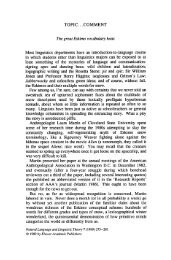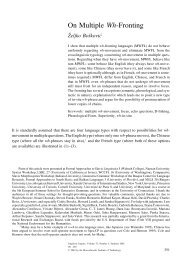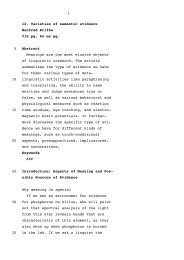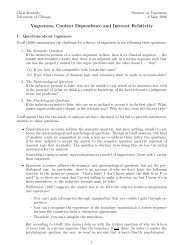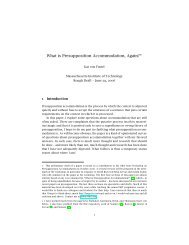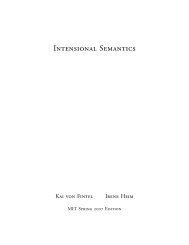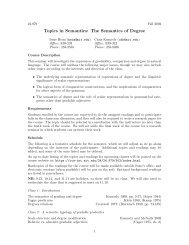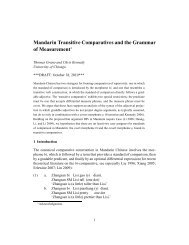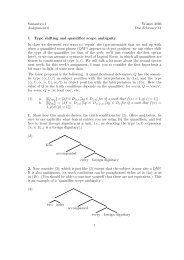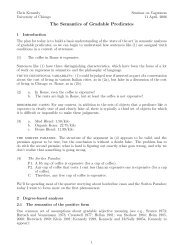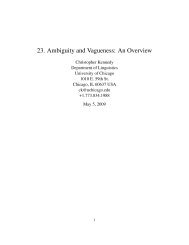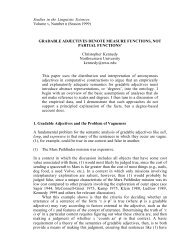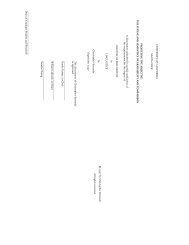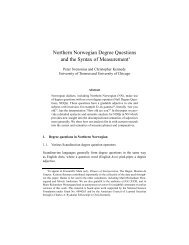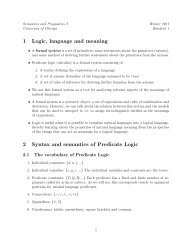On the natural history of negative polarity items - Syntax, Semantics ...
On the natural history of negative polarity items - Syntax, Semantics ...
On the natural history of negative polarity items - Syntax, Semantics ...
Create successful ePaper yourself
Turn your PDF publications into a flip-book with our unique Google optimized e-Paper software.
Raj Singh<br />
Implicature Cancellation and Exhaustivity<br />
This paper is concerned with <strong>the</strong> question <strong>of</strong> whe<strong>the</strong>r implicatures are cancellable, and with how<br />
<strong>the</strong> answer to this question might adjudicate between neo-Gricean <strong>the</strong>ories <strong>of</strong> implicature (e.g.,<br />
Horn 1972, Geurts 2010) and <strong>the</strong> grammatical <strong>the</strong>ory <strong>of</strong> implicature (e.g., Chierchia et al. 2008).<br />
1. Background: Implicature Cancellation and Exhaustivity: It is commonly assumed that an<br />
essential feature <strong>of</strong> implicatures is that, unlike entailments, <strong>the</strong>y can be cancelled (e.g., Horn 1972).<br />
(1) John ate some <strong>of</strong> <strong>the</strong> cookies. In fact, he ate {# none / all} <strong>of</strong> <strong>the</strong>m.<br />
Magri (2009, 2011) (henceforth M) argues that <strong>the</strong> oddness <strong>of</strong> texts like (2) (from Schlenker<br />
(2006)) teach us that implicature computation is mandatory and uncancellable.<br />
(2) # Mary gave <strong>the</strong> same grade to all her students. She gave some <strong>of</strong> <strong>the</strong>m an A.<br />
If <strong>the</strong> second sentence in (2) (⇤) is obligatorily interpreted with its scalar implicature (¬⇥), <strong>the</strong>n <strong>the</strong><br />
oddness can be explained as a consequence <strong>of</strong> a contradiction between <strong>the</strong> streng<strong>the</strong>ned meaning<br />
<strong>of</strong> <strong>the</strong> second sentence (⇤⌅¬⇥) and an entailment <strong>of</strong> <strong>the</strong> first sentence (⇤ ⇥), much like (3).<br />
(3) # Mary gave <strong>the</strong> same grade to all her students. She gave only some <strong>of</strong> <strong>the</strong>m an A.<br />
If implicatures could be cancelled, <strong>the</strong> contradiction in (2) could be avoided by cancelling <strong>the</strong><br />
implicature. Since (2) seems as doomed to oddness as (3), M argues that implicatures must be<br />
computed and, once generated, cannot be cancelled. To make sense <strong>of</strong> <strong>the</strong> apparent cancellability<br />
<strong>of</strong> implicatures, as in (1), he argues that what looks like cancellation is really just <strong>the</strong> hearer treating<br />
<strong>the</strong> stronger alternative as irrelevant, in which case no implicature is expected (on any <strong>the</strong>ory). (The<br />
hearer is unable to treat ⇥ as irrelevant in (2) because <strong>of</strong> a constraint on relevance M proposes; for<br />
space considerations we do not discuss this here). Since it is commonly assumed that an essential<br />
property <strong>of</strong> pragmatic inferences is that <strong>the</strong>y are cancellable (Grice 1967), M suggests that <strong>the</strong> best<br />
way to make sense <strong>of</strong> <strong>the</strong> mandatoriness <strong>of</strong> implicature computation is to assume that implicatures<br />
are computed by a silent exhaustive operator, exh (with a meaning assumed to be essentially that<br />
<strong>of</strong> only – see e.g., Fox 2007), toge<strong>the</strong>r with <strong>the</strong> assumption that sentences are always exhaustified<br />
(parsed with exh). If M is correct, <strong>the</strong> pattern in (1)-(3) argues in favor <strong>of</strong> <strong>the</strong> grammatical <strong>the</strong>ory<br />
<strong>of</strong> implicature. To our knowledge, <strong>the</strong>re is no neo-Gricean account <strong>of</strong> this pattern.<br />
2. Contributions <strong>of</strong> this paper: This paper aims to: (A) Provide empirical support for M’s claim<br />
that when an alternative is relevant <strong>the</strong> corresponding implicature cannot be cancelled. (B) Argue<br />
that, contra M, <strong>the</strong> conclusion in (A) does not undermine neo-Gricean <strong>the</strong>ories <strong>of</strong> implicature.<br />
Specifically, we will argue (against <strong>the</strong> common interpretation) that <strong>the</strong> neo-Gricean Maxim <strong>of</strong><br />
Quantity actually entails that implicatures must be computed. If this is right, <strong>the</strong>re is no need<br />
to assume exh in <strong>the</strong> account <strong>of</strong> (1)/(2). (C) Provide evidence that ignorance inferences that are<br />
independent <strong>of</strong> exhaustivity are also mandatory and uncancellable, <strong>the</strong>reby supporting <strong>the</strong> conclusion<br />
that neo-Gricean reasoning is mandatory and uncancellable independent <strong>of</strong> whe<strong>the</strong>r exh is<br />
responsible for implicature computation. (D) Derive Hurford’s Constraint (HC, Hurford 1974) on<br />
disjunctive sentences. HC has been used to motivate <strong>the</strong> existence <strong>of</strong> exh, but it has no obvious<br />
pragmatic motivation. We will argue that <strong>the</strong> data that motivated HC can be derived (without having<br />
to stipulate HC) as consequences <strong>of</strong> (C) toge<strong>the</strong>r with <strong>the</strong> assumption <strong>natural</strong> languages do in<br />
fact have access to exh; without exh and (C) <strong>the</strong> data lack a principled explanation.<br />
A. Relevance and Cancellation: M proposed that cancellation should be reanalyzed as <strong>the</strong> effect<br />
<strong>of</strong> ignoring an alternative by treating it as irrelevant, but did not provide evidence independent <strong>of</strong><br />
his purposes to support this. When we force an alternative to be relevant (e.g., by asking a question<br />
that makes it relevant), M’s suggestion that cancellation is impossible seems to be supported.<br />
(4) A: How many <strong>of</strong> <strong>the</strong> cookies did John eat?<br />
1



